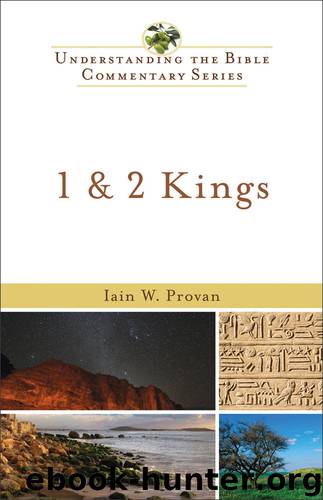1 & 2 Kings (Understanding the Bible Commentary Series) by Provan Iain W

Author:Provan, Iain W. [Provan, Iain W.]
Language: eng
Format: epub
Publisher: Baker Publishing Group
Published: 2012-06-30T16:00:00+00:00
* * *
§31 Ahab Dispatched (1 Kgs. 22:1–40 )
* * *
The house of Ahab stands under the prophetic curse. The full outworking of God’s wrath is to be delayed until the reign of Ahab’s son, because of the king’s response to Elijah (21:27–29). Ahab’s own death, however, has now been foretold by two different prophets, with no delay in prospect (20:41–42; 21:19), and we thus anticipate an early fulfillment of their prophecy. The appearance now of a third prophet brings us to that fulfillment, as Ahab marches out to meet the Arameans at Ramoth Gilead and falls in battle.
22:1–5 / The peace that followed the battle of Aphek (20:26–34) lasted three years (v. 1). Even after such a crushing defeat, however, the king of Aram was still able to hold on to the strategically important city of Ramoth Gilead in Transjordan (v. 3). Ahab now wishes to take this city back, with the help of Jehoshaphat king of Judah. The story of Judah has been suspended for some time now, as we have followed the course of northern history from Nadab through to Ahab (15:25–21:29), and we shall find out more about Jehoshaphat shortly (22:41–50). From these few verses, however, two things are already apparent. First, he is at peace with Ahab (cf. 22:44). The precise circumstances in which peace was re-established between Judah and Israel after the long war described in 14:30; 15:6–7, 16–22 are not described, but given the internal conflict in Israel after Baasha’s reign (16:8–22) and the threat of Aram on Israel’s northern border from his reign onwards, peace with Judah in the south would have been a political necessity. Secondly, Jehoshaphat is a devout man. He is happy to go with Ahab to fight against Ramoth Gilead, but first he wants to seek the counsel of the L ORD (vv. 4–5). We shall hear more of this commitment to the L ORD in 22:43, 46.
22:6–8 / Ahab’s response to Jehoshaphat is to gather together the prophets to ask for their counsel. The Hebrew here is wayyiq ḇ ô ṣ . . . ʾe ṯ -hann e ḇ îʾîm , which is rendered by the NIV in 18:20 as he “assembled the prophets”—this is the only other place in the OT (apart from 2 Chron. 18:5, which is parallel to 1 Kgs. 22:6) where the same phrase occurs. This is very interesting, in view of the fact that 400 prophets are missing from the assembly on Mount Carmel (cf. the additional note on 18:19) and about four hundred turn up here (v. 6). Just as interesting is the way in which verses 6–7 are worded. Jehoshaphat seeks “the word of the L ORD ,” so Ahab summons “the prophets,” whose precise relationship to the L ORD is left unstated. Jehoshaphat’s response to them is to ask if there is not a prophet of the L ORD (relationship made explicit) who might be now be consulted. Whether he is implying that the others are not prophets of the L ORD is unclear.
Download
This site does not store any files on its server. We only index and link to content provided by other sites. Please contact the content providers to delete copyright contents if any and email us, we'll remove relevant links or contents immediately.
| Exegesis & Hermeneutics | New Testament |
| Old Testament |
The Five People You Meet in Heaven by Mitch Albom(3569)
The Secret Power of Speaking God's Word by Joyce Meyer(3222)
Real Sex by Lauren F. Winner(3023)
Name Book, The: Over 10,000 Names--Their Meanings, Origins, and Spiritual Significance by Astoria Dorothy(2987)
The Holy Spirit by Billy Graham(2953)
0041152001443424520 .pdf by Unknown(2846)
How The Mind Works by Steven Pinker(2816)
ESV Study Bible by Crossway(2778)
Ancient Worlds by Michael Scott(2689)
Churchill by Paul Johnson(2587)
The Meaning of the Library by unknow(2573)
The ESV Study Bible by Crossway Bibles(2551)
The Gnostic Gospels by Pagels Elaine(2532)
MOSES THE EGYPTIAN by Jan Assmann(2417)
Jesus by Paul Johnson(2363)
City of Stairs by Robert Jackson Bennett(2354)
The Complete Dead Sea Scrolls in English (7th Edition) (Penguin Classics) by Geza Vermes(2283)
The Nativity by Geza Vermes(2233)
Ancient Near Eastern Thought and the Old Testament by John H. Walton(2226)
